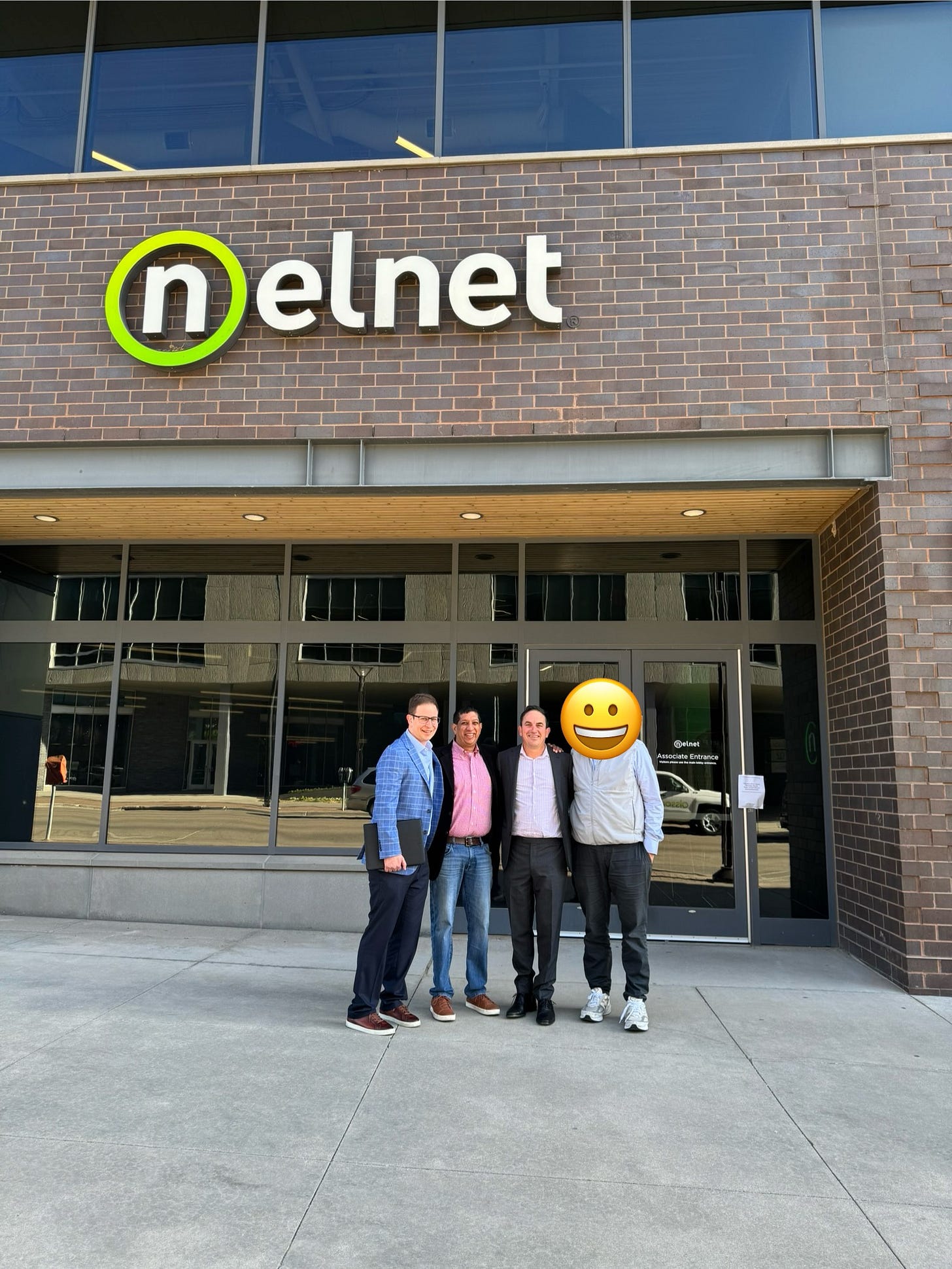Is Nelnet an AI Play?
Reflections on Attending Nelnet’s Annual Meeting
A group of value investors (who also happen to be Nelnet fanboys) and I had the pleasure of attending Nelnet’s (NYSE: NNI) annual meeting last week in Lincoln, Nebraska. And as you can see the crowds to get in were intense.
We had the opportunity to meet Chairman Mike Dunlap, CEO Jeff Noordhoek, and other top executives. There were very few attendees, and as I’ve said before, I remain surprised that more value investors and Berkshire fans aren’t paying closer attention.
I came away convinced that beyond the many positive aspects of Nelnet I’ve previously written about, the company is clearly a beneficiary of AI. Management highlighted this during the meeting, noting that Nelnet is deploying AI in multiple ways.
Nelnet is seeing breakthroughs in efficiency and throughput across the organization. For example, when dealing with thousands of templates for responding to student loan servicing inquiries, a new AI tool can narrow the choices down to three for the employee, rather than requiring them to sift through thousands manually.
Another example involves quality assurance. Previously, human employees listened to calls and provided feedback. Now, AI can perform this task in real time, offering feedback and suggestions instantly to the servicing agent. AI is also handling a significant volume of customer requests before human intervention is even needed. These developments are fundamentally transforming Nelnet’s servicing operations, resulting in dramatic improvements in efficiency and productivity. AI may also unlock new revenue opportunities and support growth across Nelnet’s diverse business lines.
While companies like Nvidia (NASDAQ: NVDA) and Microsoft (NASDAQ: MSFT) are often seen as the core AI plays, what if Nelnet—and many others—are also major AI beneficiaries?
Why is this important? Management pointed out that the Biden administration allowed $1.2 trillion in student loans to be paused from repayment.
That’s “T” as in Trillion.
A few weeks ago, the Trump administration began notifying borrowers that repayments must resume. Nelnet, as one of the few loan servicers—and the largest, with the best reputation—is likely to service many of these loans. This will involve helping borrowers enter repayment plans and working to collect a significant portion of the $1.2 trillion.
So, just as Nelnet is facing a potential surge in servicing demand, it’s experiencing significant gains in productivity and efficiency. This means it can now service loans more effectively, more quickly, and potentially at a lower cost. That’s a recipe for meaningful profit growth.
At the same time, one of Nelnet’s core divisions is poised to become more profitable, the company is seeing a surge of cash return to its balance sheet. We’ve previously discussed the company’s potentially billion-dollar year, thanks to cash payments from an Allo refinancing and the continued wind-down of its student loan portfolio.
One of my favorite quotes from the meeting came from Mike Dunlap:
“Nelnet is a play on chaos.”
I believe what he meant is that when markets get volatile or investors become fearful, Nelnet is positioned—with a strong balance sheet and ample cash—to make highly attractive purchases. The company has reviewed every student loan securitization prospectus out there. When liquidity is scarce, there are very few buyers—and even fewer who understand the true value of what’s for sale.
And remember, Nelnet now has a bank, which allows it to redeploy capital into safe, yet compelling 15%+ return loans (thanks to moderate leverage). This adds a powerful new tool to the company’s arsenal—one it didn’t have before.
So, in any future drawdown, liquidity crunch, or market disruption, Nelnet has the financial strength and cash flows to capitalize on dislocations and the liquidity needs of other players.
One last point: HUDL, a leader in video, data, and sports analytics for professional, collegiate, high school, and youth sports, is a material investment for Nelnet. After the meeting, we visited HUDL headquarters and briefly met with CEO David Graff.
Don’t sleep on HUDL. A close friend of mine—and longtime Nelnet investor—believes HUDL could go public within the next one to two years. If and when that happens, investors may be surprised at the valuation HUDL commands. Nelnet owns 23% of HUDL, and this investment could easily eclipse the attractive returns from Allo.
I’m grateful for the warmth and hospitality shown to us by Mike Dunlap, Jeff Noordhoek, and the entire Nelnet leadership team during our visit to Lincoln—a very charming city. We were impressed by the thoughtfulness of the company and the strength of its position.
In a time of volatility and profound technological change, it’s rare to find a company that not only benefits from such volatility (thanks to its fortress-like balance sheet) but is also harnessing those technological changes to grow and improve operations—ultimately creating more shareholder value.
This is an exciting time to be a Nelnet investor.
P.S. For those unfamiliar with Mike Dunlap, my guess is he won’t love this post. He’s a non-promotional kind of leader who focuses on delivering results for all Nelnet stakeholders. But someone has to write about the opportunity here—and I’m happy to be the one!



